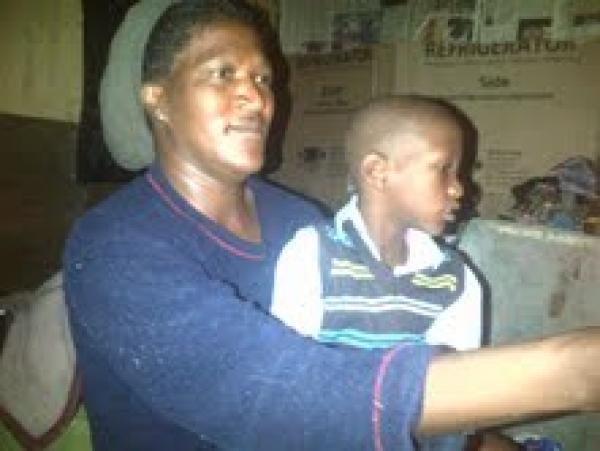How do you look after an autistic child when you live in a shack?

“I have to tie his leg to the couch. If I don’t he wanders away and I have to run around the whole of RR section in search of him, giving people a description of him and asking if anyone has seen a boy resembling my son.”
These are the words of Patricia, mother to Teko, a seven year old boy diagnosed with autism (names changed). RR Section is one of the poorest parts of Khayelitsha. Patricia and Teko live in a shack with Patricia’s husband and Teko’s brother and sister.
Autism is a brain illness. People with autism have problems communicating and interacting with society. Autism can be mild: some autistic people can lead almost normal lives. But Teko’s autism is very serious. Children with autism can appear unaware of their surroundings. They can fail to respond to sights and sounds the way most people do. Many, but not all, children with autism have mental disabilities. Others have normal or far above normal intelligence. Children with autism can also have seizures and other serious problems.
While doing community work, a volunteer with the Social Justice Coalition, who informed GroundUp of Teko’s situation, saw him tied up to a chair and thought the child was being mistreated. But to her surprise she found out that this was Patricia’s only means of keeping her son from wandering away.
When I visited Teko’s house he was at school, at Mizamo Yethu, a school for children with special needs in Khayelitsha. Patricia explained how she struggles to look after her child.
At the day hospital in Khayelitsha a doctor told her that her child was autistic. He gave her medication to give to her child but advised that she should stop giving Teko the medication if it made him more aggressive. However if it managed to make him calmer, she should continue using it. But the medication only made Teko more aggressive and so Patricia stopped giving it to her.
When Teko was about two years old his mom noticed that something was wrong because he didn’t respond to her when she called out to him. At Groote Schuur hospital it was discovered that he had an infection in both his ears that made him deaf.
Teko underwent an operation and after the operation he responded by looking in the direction of the caller when called. But Teko cannot speak. Teko has to wear diapers and, Patricia says, is extremely aggressive around the house. Patricia has to move the television and furniture away because Teko destroys everything he gets hold of.
“I’m lucky that nothing bad has happened to him yet when he wanders away and I’m terrified that something bad might happen the next time he wonders away. I wish I had a safe and secure house with fencing all around, where he had a room of his own with toys that he could play with. My shack doesn’t have burglar doors to keep him safe inside and that’s why I tie him down to the sofa,” Patricia said.
Patricia is unemployed. Teko’s disability grant is used to support him and his siblings.
Next: Vavi at TAC AGM
Previous: Messy politics of toll roads

This article is licensed under a Creative Commons Attribution-NoDerivatives 4.0 International License.


